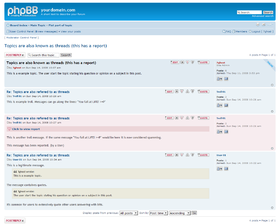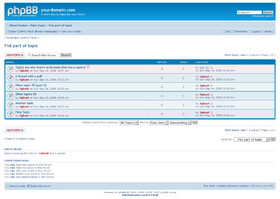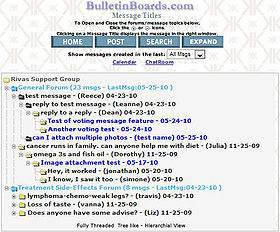Forums have a specific set of jargon associated with them; e.g. a single conversation is called a "thread".
A discussion forum is hierarchical or tree-like in structure: a forum can contain a number of subforums, each of which may have several topics. Within a forum's topic, each new discussion started is called a thread, and can be replied to by as many people as wish to.
Depending on the forum's settings, users can be anonymous or have to register with the forum and then subsequently log in in order to post messages. On most forums, users do not have to log in to read existing messages.
History
The modern forum originated from bulletin boards, and are a technological evolution of the dialup bulletin board system.[2][3] From a technological standpoint, forums or boards are web applications managing user-generated content.[3][4]Early Internet forums could be described as a web version of an electronic mailing list or newsgroup (such as exist on Usenet); allowing people to post messages and comment on other messages. Later developments emulated the different newsgroups or individual lists, providing more than one forum, dedicated to a particular topic.[2]
Internet forums are prevalent in several developed countries. Japan posts the most with over two million per day on their largest forum, 2channel. China also has many millions of posts on forums such as Tianya Club.
Forums perform a function similar to that of dial-up bulletin board systems and Usenet networks that were first created starting in the late 1970s.[2] Early web-based forums date back as far as 1994, with the WIT[5] project from W3 Consortium and starting from this time, many alternatives were created.[6] A sense of virtual community often develops around forums that have regular users. Technology, computer games and/or video games, sports, music, fashion, religion, and politics are popular areas for forum themes, but there are forums for a huge number of topics. Internet slang and image macros popular across the Internet are abundant and widely used in Internet forums.
Forum software packages are widely available on the Internet and are written in a variety of programming languages, such as PHP, Perl, Java and ASP. The configuration and records of posts can be stored in text files or in a database. Each package offers different features, from the most basic, providing text-only postings, to more advanced packages, offering multimedia support and formatting code (usually known as BBCode). Many packages can be integrated easily into an existing website to allow visitors to post comments on articles.
Several other web applications, such as weblog software, also incorporate forum features. Wordpress comments at the bottom of a blog post allow for a single-threaded discussion of any given blog post. Slashcode, on the other hand, is far more complicated, allowing fully threaded discussions and incorporating a robust moderation and meta-moderation system as well as many of the profile features available to forum users.
Some stand alone threads on forums have reached fame and notability such as the "I am lonely will anyone speak to me" thread on MovieCodec.com's forums which was described as the "web's top hangout for lonely folk" by Wired Magazine.[7]
Forum structure
A forum consists of a tree like directory structure. The top end is "Categories". A forum can be divided into categories for the relevant discussions. Under the categores are sub-forums and these sub-forums can further have more sub-forums. The topics (commonly called threads) come under the lowest level of sub-forums and these are the places under which members can start their discussions or posts. Logically forums are organized into a finite set of generic topics (usually with one main topic) driven and updated by a group known as members, and governed by a group known as moderators.[citation needed] It can also have a graph structure.[8] All message boards will use one of three possible display formats. Each of the three basic message board display formats: Non-Threaded/Semi-Threaded/Fully Threaded, has its own advantages and disadvantages. If messages are not related to one another at all a Non-Threaded format is best. If you have a message topic and multiple replies to that message topic a semi-threaded format is best. If you have a message topic and replies to that message topic, and replies to replies, then a fully threaded format is best.[9]User groups
Internally, Western-style forums organize visitors and logged in members into user groups. Privileges and rights are given based on these groups. A user of the forum can automatically be promoted to a more privileged user group based on criteria set by the administrator.[10] A person viewing a closed thread as a member will see a box saying he does not have the right to submit messages there, but a moderator will likely see the same box granting him access to more than just posting messages.[11]An unregistered user of the site is commonly known as a guest or visitor. Guests are typically granted access to all functions that do not require database alterations or breach privacy. A guest can usually view the contents of the forum or use such features as read marking, but occasionally an administrator will disallow visitors to read their forum as an incentive to become a registered member.[note 1] A person who is a very frequent visitor of the forum, a section or even a thread is referred to as a lurker and the habit is referred to as lurking. Registered members often will refer to themselves as lurking in a particular location, which is to say they have no intention of participating in that section but enjoy reading the contributions to it.
Moderators
The moderators (short singular form: "mod") are users (or employees) of the forum who are granted access to the posts and threads of all members for the purpose of moderating discussion (similar to arbitration) and also keeping the forum clean (neutralizing spam and spambots etc.).[12] Because they have access to all posts and threads in their area of responsibility, it is common for a friend of the site owner to be promoted to moderator for such a task. Moderators also answer users' concerns about the forum, general questions, as well as respond to specific complaints. They also can do anything to lend a helping hand to a user in need.[13] Moderators themselves may have ranks: some may be given mod privileges over only a particular topic or section (called "local"), while others (called "global" or "super") may be allowed access anywhere. Common privileges of moderators include: deleting, merging, moving, and splitting of posts and threads, locking, renaming, stickying of threads, banning, suspending, unsuspending, unbanning, warning the members, or adding, editing, removing the polls of threads.[14] "Junior Modding", "Backseat Modding", or "Forum copping" can refer negatively to the behavior of ordinary users who take a moderator-like tone in criticizing other members.Essentially, it is the duty of the moderator to manage the day-to-day affairs of a forum or board as it applies to the stream of user contributions and interactions. The relative effectiveness of this user management directly impacts the quality of a forum in general, its appeal, and its usefulness as a community of interrelated users.
Moderators also have categories e.g. "Global Moderators" and just "Moderators". Global moderators have the rights to moderate the complete forum while moderators can be assigned only to the sub-forum.[15]
Administrator
The administrators (short form: "admin") manage the technical details required for running the site. As such, they may promote (and demote) members to moderators, manage the rules, create sections and sub-sections, as well as perform any database operations (database backup etc.). Administrators often also act as moderators. Administrators may also make forum-wide announcements, or change the appearance (known as the skin) of a forum.[14]Post
A post is a user-submitted message enclosed into a block containing the user's details and the date and time it was submitted. Members are usually allowed to edit or delete their own posts. Posts are contained in threads, where they appear as boxes one after another. The first post starts the thread; this may be called the TS (thread starter) or OP (original post). Posts that follow in the thread are meant to continue discussion about that post, or respond to other replies; it is not uncommon for discussions to be derailed.On Western forums, the classic way to show a member's own details (such as name and avatar) has been on the left side of the post, in a narrow column of fixed width, with the post controls located on the right, at the bottom of the main body, above the signature block. In more recent forum software implementations the Asian style of displaying the members' details above the post has been copied.
Posts have an internal limit usually measured in characters. Often one is required to have a message of minimum length of 10 characters. There is always an upper limit but it is rarely reached – most boards have it at either 10,000, 20,000, 30,000 or 50,000 characters.
Most forums keep track of a user's postcount. The postcount is a measurement of how many posts a certain user has made.[16] Users with higher postcounts are often considered more reputable than users with lower postcounts. Some forums have disabled postcounts in the hopes that doing so will reduce the emphasis on quantity over quality of information.
Thread
See also: conversation threading
A thread (sometimes called a topic) is a collection of posts, usually displayed from oldest to latest, although this is typically configurable: options for newest to oldest and for a threaded view (a tree-like view applying logical reply structure before chronological order) can be available. A thread is defined by a title, an additional description that may summarize the intended discussion, and an opening or original post (common abbreviation OP, which can also mean original poster) which opens whatever dialogue or makes whatever announcement the poster wished. A thread can contain any number of posts, including multiple posts from the same members, even if they are one after the other.A thread is contained in a forum, and may have an associated date which is taken as the date of the last post (options to order threads by other criteria are generally available). When a member posts in a thread it will jump to the top since it is the latest updated thread. Similarly, other threads will jump in front of it when they receive posts. When a member posts in a thread for no reason but to have it go to the top, it is referred to as a bump or bumping. Threads which are important but rarely receive posts are stickyed (or, in some software, "pinned"). A sticky thread will always appear in front of normal threads, often in its own section. A "threaded discussion group" is simply any group of individuals who use a forum for threaded, or asynchronous, discussion purposes. The group may or may not be the only users of the forum.
A thread's popularity is measured on forums in reply (total posts minus one – the opening post, unless the forums have it set so that the op doesn't count) counts. Some forums also track page views. Threads meeting a set number of posts or a set number of views may receive a designation such as "hot thread" and be displayed with a different icon compared to others threads. This icon may stand out more to emphasize the thread. If the forum's users have lost interest in a particular thread, it becomes a dead thread.
Activity
Start a discussion board and encourage your friends to join the online forum.


